Summary Inflation Report Consumer Price Index for the
Bottom 30% Income Households
Sultan Kudarat Province
OCTOBER 2024
(2018=100)
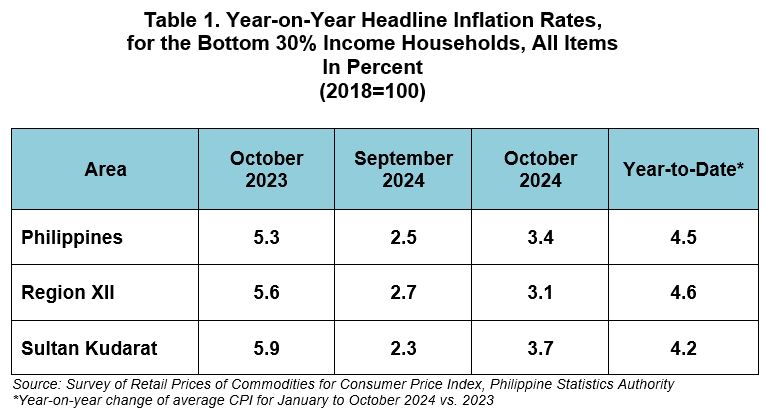
Inflation in Sultan Kudarat Province
1. Overall Inflation
The overall inflation rate for the bottom 30% income households in the province of Sultan Kudarat increased to 3.7 percent in October 2024, compared to 2.3 percent reported in September 2024. In October 2023 inflation was higher at 5.9 percent. (Table 1, Table 2 and Figure 1)
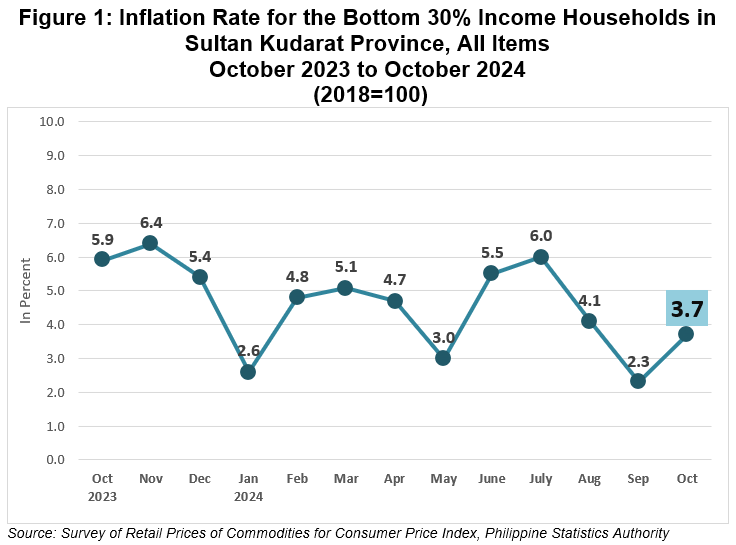
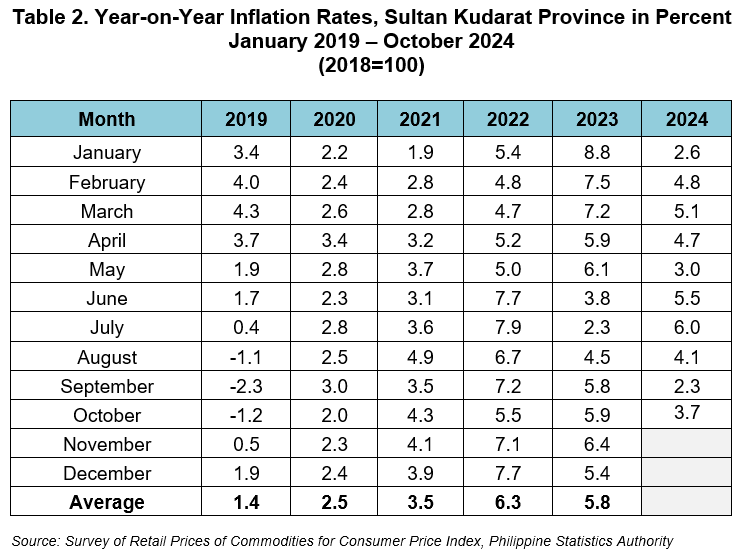
1.1. Main Drivers to the Upward Trend of Inflation Rate of the Bottom 30% Income Households
The main source of the uptrend of inflation in the bottom 30% income households in the province for October 2024 was brought about by the higher annual growth rate in the index of Housing, Water, Electricity, Gas and Other Fuels at 2.6 percent inflation compared to -5.0 percent deflation in September 2024. This was followed by Food and Non-Alcoholic Beverages at 5.2 percent compared to 4.5 percent in September 2024 and Transport at -1.7 percent deflation compared to -3.5 percent deflation in September 2024.
In addition, the following commodity groups also contributed to the uptrend of inflation during the month compared to its September 2024 annual rate.
a. Personal Care, and Miscellaneous Goods and Services, 2.0 percent compared to 1.4 percent; and
b. Health at 1.4 percent compared to 1.3 percent.
In contrast, three commodity groups showed lower inflation during the month.
a. Clothing and footwear at 0.8 percent compared to 1.1 percent;
b. Furnishings, household equipment and routine household maintenance at 3.9 percent compared to 4.3 percent; and
c. Recreation, sport and culture at 3.1 percent compared to 3.6 percent.
Meanwhile, the indices of the rest of the commodity groups retain their previous month's inflation rate. (Table 3)
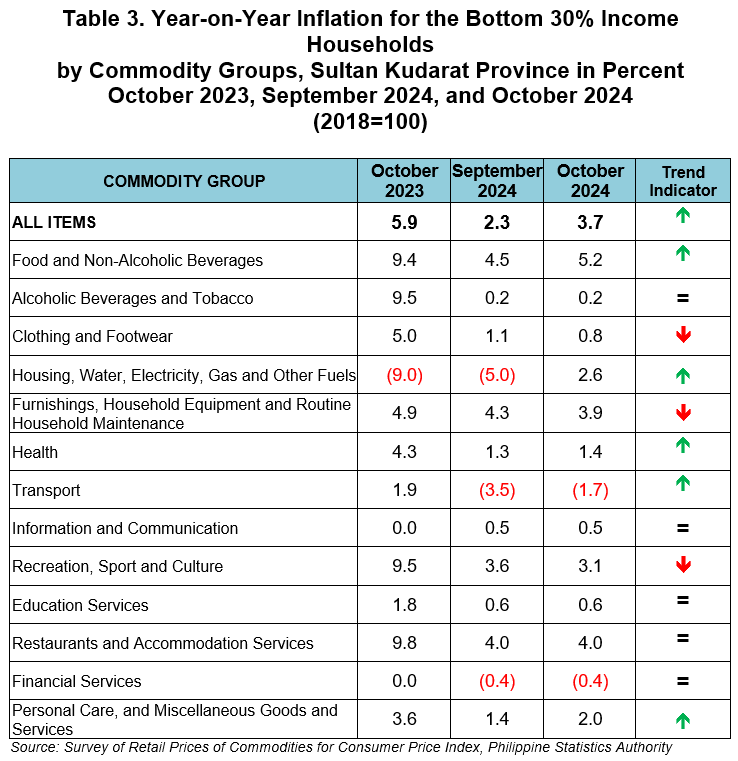
1.2 Main Contributors to the Overall Inflation
The following commodity groups were the top three contributors to the overall inflation for the bottom 30% income households during the month:
a. Food and Non-Alcoholic Beverages with 80.1 percent share;
b. Housing, Water, Electricity, Gas and Other Fuels with 8.7 percent share; and
c. Restaurants and Accommodation Services with 7.2 percent share.
2. Food Inflation
The food inflation for the bottom 30% income households in the province likewise increased to 5.4 percent compared to its 4.7 reported in September 2024. In October 2023, food inflation was higher at 9.6 percent.
The following food groups also showed higher inflation during the month.
a. Fish and other seafood, at 1.8 percent compared to -1.4 percent deflation;
b. Oils and Fats at 15.3 percent compared to 12.7 percent;
c. Fruits and nuts at 12.9 percent compared to 11.9 percent; and
d. Ready-made food and other food products n.e.c., at 3.7 percent compared to 3.3 percent.
In contrast, four (4) food groups showed lower inflation during the month.
a. Rice at 14.7 percent compared to 15.0 percent;
b. Flour, Bread and Other Bakery Products, Pasta Products, and Other Cereals at 1.6 percent compared to 1.8 percent;
c. Meat and other parts of slaughtered land animals at 0.6 percent compared to 2.7 percent; and
d. Milk, other dairy products and eggs at 3.6 percent compared to 8.4 percent in September 2024.
Three food groups showed deflation during the month.
a. Vegetables, tubers, plantains, cooking bananas and pulses at -8.7 percent deflation;
b. Corn at -1.2 percent deflation; and
c. Sugar, confectionery and desserts at –7.8 percent deflation (Table 4).
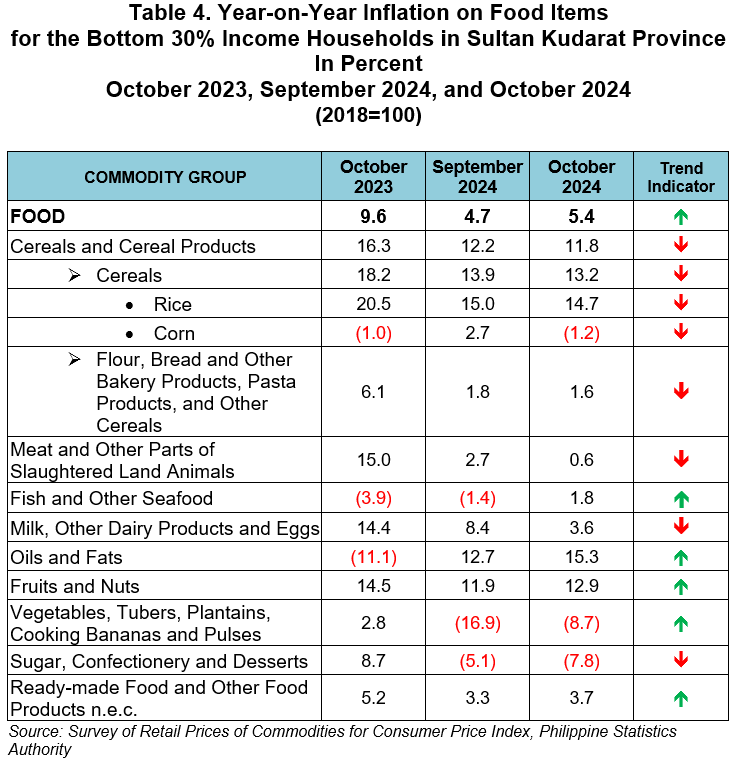
Main Contributors to the Food Inflation of the Bottom 30% Income Households
The food groups with the highest contribution to food inflation during the month were the following:
a. Cereals and cereal products with 94.5 percent share;
b. Fruits and Nuts with 7.0 percent share;
c. Fish and other seafood with 4.8 percent share.
TECHNICAL NOTES
Consumer Price Index (CPI):
❖A measure of the change in the average retail prices of a fixed basket of goods and services commonly purchased by households relative to base year.
❖It measures the composite change in the consumer prices of various commodities overtime.
❖It stands for the percentage change in the average prices of goods and services commonly bought by a group of consumers from the base year.
Components of the CPI:
Market Basket
❖refers to sample of goods and services commonly purchased by a particular group of consumers in a particular area.
Weight
❖a value attached to a commodity or group of commodities to indicate the relative importance of that commodity or group of commodities in the market basket.
Base Period
❖a period usually a year, at which the index number is set to 100 or it is the reference point of the index number series.
Index Method
❖gives the formula used in computing the index number.
Sample Outlets
❖establishment or retail outlets where prices of commodities/services are collected or quoted.
Inflation Rate (IR)
❖rate of change in the average price level as measured by the CPI between two periods.
❖it is equivalent to the decline in the internal purchasing of the peso.
❖it is derived indicator by comparing the CPI between two periods, usually a year.
Approved for Release:
MARIFI P. DE ASIS
OIC-Chief Statistical Specialist
For inquiries, please contact:
LOVELY JOY M. PARAS
Administrative Aide VI
Provincial Focal Person

